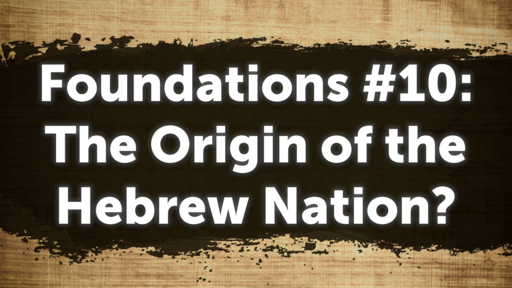Foundations #10: The Origin of the Hebrew Nation

Foundations • Sermon • Submitted • Presented • 1:05:04
0 ratings
· 22 viewsThe ending of the foundational first 11 chapters of the book of Genesis.
Files
Notes
Transcript
I. Introduction
I. Introduction
Foundations #1: The God of Creation
Foundations #1: The God of Creation
Foundations #2: The God Who Made Us
Foundations #2: The God Who Made Us
Foundations #3: The Corruption of God’s Creation
Foundations #3: The Corruption of God’s Creation
Foundations #4: The Fallen First Family
Foundations #4: The Fallen First Family
Foundations #5: The Line of the Promise
Foundations #5: The Line of the Promise
Foundations #6: The Flood of Noah (Part 1)
Foundations #6: The Flood of Noah (Part 1)
Foundations #6: The Flood of Noah (Part 2)
Foundations #6: The Flood of Noah (Part 2)
Foundations #7: Universal Covenant
Foundations #7: Universal Covenant
Foundations #8: The Table of Nations
Foundations #8: The Table of Nations
Foundations #9: The Tower of Babel
Foundations #9: The Tower of Babel
II. Repeat of the Toledot of Shem (Gen 11:10-26)
II. Repeat of the Toledot of Shem (Gen 11:10-26)
a. Shem as progenitor after the flood.
a. Shem as progenitor after the flood.
b. A second look at the tables to review the years of the Patriarchs
b. A second look at the tables to review the years of the Patriarchs
Many of the patriarchs were still alive to see several generations of their descendents.
We see the postdiluvian Patriarchs’ lifespans decrease after the flood.
c. A closer look at Eber (Gen 11:16-17)
c. A closer look at Eber (Gen 11:16-17)
Eber is first mentioned in Genesis 10:21, 24–25.
Eber is mentioned in the line of Jesus Christ in Luke 3:35.
Eber means:
“the opposite side” (HIBD)
“on the other side” (HALOT)
The Lexham Bible Dictionary Eber and the Term “Hebrew”
Josephus makes this connection between the terms in his Antiquities of the Jews: “his son was Heber, from whom they originally called the Jews Hebrews” (Josephus, Antiquities 17)
Abram the Hebrew (Gen 14:13; cf. Acts 7:2–3)
Abraham would later get a wife for Isaac from among the Hebrews (Gen 24:2–4; cf. Gen 24:15–16, Gen 24:50–51)
The God of the Hebrews (Exo 3:18; 5:3; 7:16; 9:1; 10:3)
III. The Toledot of Terah (Gen 11:27-32)
III. The Toledot of Terah (Gen 11:27-32)
a. Terah fathered three sons: Abram, Nahor, and Haran
a. Terah fathered three sons: Abram, Nahor, and Haran
b. Haran was the father of Lot, Milcah, and Iscah
b. Haran was the father of Lot, Milcah, and Iscah
c. Abram and Nahor took wives
c. Abram and Nahor took wives
Abram married Sarai his barren (v. 30) half sister (Gen 20:12)
Nahor married Milcah (his niece)
d. They leave Ur, except for Nahor
d. They leave Ur, except for Nahor
intended to go to the land of Canaan
they settle in Haran
e. Terah dies in Haran at age 205.
e. Terah dies in Haran at age 205.
IV. Foundational Importance
IV. Foundational Importance
1. Gen 1–11 is the prelude to the rest of the biblical story
1 Now the Lord said to Abram, “Go from your country and your kindred and your father’s house to the land that I will show you.
2. Genesis 12:1 explains the reason for the toledot of Terah
3. This story shows that God chooses whom He will to work his purpose despite human failings and preserves a remnant for Himself.
